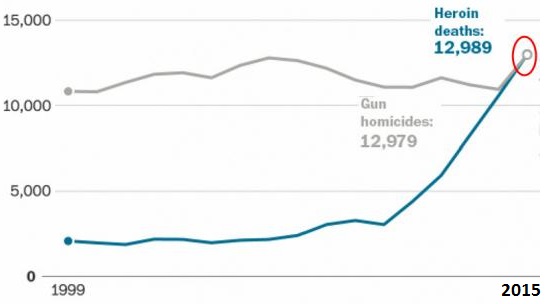We all know there is a scourge of addiction and premature death plaguing the nation, a scourge that is killing thousands and ruining millions of lives: the deaths resulting from the opioid epidemic (largely the result of “legal” synthetic narcotics) are mounting at an alarming rate:

We also know that the proximate cause of this epidemic is Big Pharma, which promised non-addictive painkillers that lasted for 12 hours but delivered addictive painkillers that did not last 12 hours.
The unsavory truth was reported by the Los Angeles Times last May (2016) in a scathing investigative series: ‘You Want a Description of Hell?’ Oxycontin’s 12-hour problem.
There are plenty of other participants who share responsibility for the public health and law-enforcement disaster: physicians who all too readily passed out prescriptions for powerful synthetic opioids like aspirin; the government agencies that approved the synthetic heroin as “safe” (heh) and paid for their distribution via Medicaid, the Veterans Administration, etc., and the patients who all too willingly accepted the false promises of synthetic opioids.
But what’s missing from the public conversation is the underlying cause of the epidemic: a structural scarcity of paid work and positive social roles for vast swaths of America’s workforce.
We all know what paid work means: jobs. Positive social roles include jobs–supporting oneself and one’s family provides purpose, meaning, identity and a source of pride, all atrributes of positive social roles–but the concept extends beyond work to any role in which the participant feels needed and that offers dignity: this includes volunteer, guardian, mentor, coach, etc., many of which are unpaid.
At its core, to be treated with dignity means being considered worthy of respect. Certain situations bring out a clear, conscious sense of our own dignity: when we receive praise or promotions at work, when we see our children succeed, when we see a volunteer effort pay off and change our neighborhood for the better. We feel a sense of dignity when our own lives produce value for ourselves and others. Put simply, to feel dignified, one must be needed by others.













Leave A Comment